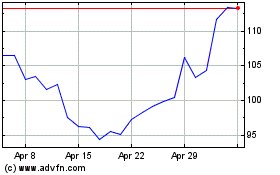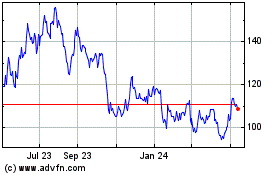UberChina Take Aim at Didi in Ride Sharing for Private Cars
June 03 2016 - 2:20AM
Dow Jones News
Uber Technologies Inc.'s Chinese unit wants to overtake local
market leader Didi Chuxing Technology Co. in China's private-car
ride-sharing sector next year, a senior executive said Friday.
In China's hypercompetitive car-hailing market, UberChina has
been locked in a fierce battle with Didi to attract drivers and
passengers. While Didi remains the market leader, UberChina has
been gaining ground rapidly, said Liu Zhen, the company's senior
vice president of strategy, at the Converge technology conference
hosted by The Wall Street Journal and f.ounders in Hong Kong.
"Last year we were only operating in eight cities with only a 1%
market share [in China]," Ms. Liu said. But since then, Uber's
ride-sharing market share has surged to nearly a third, she said.
Ms. Liu said that China is "absolutely" the most important market
in the world for Uber now.
Still, Uber faces an uphill battle in China against Didi, which
dominates China's taxi-hailing market and has a larger share than
UberChina in the private-car-hailing segment. The two companies
have disagreed on the exact market share figures.
In China, the world's biggest mobile internet market by users,
UberChina and Didi are intensifying their battle as they raise more
funds from powerful investors. UberChina is backed by Chinese
search provider Baidu Inc., while Didi's major investors include
Alibaba Group Holding Ltd. and social network giant Tencent
Holdings Ltd.
Last month, Apple Inc. poured $1 billion into Didi. Uber
Technologies, meanwhile, recently raised $3.5 billion from the
investment arm of Saudi Arabia. Ms. Liu said that part of the $3.5
billion fund will flow into Uber's China operations.
Ms. Liu said UberChina's alliance with Baidu is an advantage
because passengers can hail an Uber ride using Baidu's mobile map
app, which has hundreds of millions of users. Didi, meanwhile, has
been working closely with Tencent, which operates the popular
WeChat messaging application, which has more than 700 million
monthly active users. WeChat comes with a ride-hailing button that
directs users to Didi Kuaidi's service.
Intense competition in China's ride-hailing market has forced
major players to continue subsidizing the cost of rides for both
passengers and drivers. Some investors and analysts have said the
companies will need to gradually shift toward more sustainable
business models.
Ms. Liu said that UberChina could build a profitable business
"soon" as it has been cutting costs and spending less on incentives
for drivers. The company is now spending 80% less per trip than it
did a year ago, she said.
"We are on the right track" to turn operations profitable, she
said.
Discount wars in China's mobile on-demand services sector have
already resulted in some high-profile mergers. Didi, for example,
was created last year due to the merger between two rival
ride-hailing startups.
Asked whether UberChina would ever consider a merger with Didi,
Ms. Liu didn't provide an answer but instead talked about
UberChina's growth and improvements in the efficiency of its
operations.
UberChina and Didi "have a lot in common to talk about," she
said.
Write to Juro Osawa at juro.osawa@wsj.com
(END) Dow Jones Newswires
June 03, 2016 02:05 ET (06:05 GMT)
Copyright (c) 2016 Dow Jones & Company, Inc.
Baidu (NASDAQ:BIDU)
Historical Stock Chart
From Mar 2024 to Apr 2024

Baidu (NASDAQ:BIDU)
Historical Stock Chart
From Apr 2023 to Apr 2024
